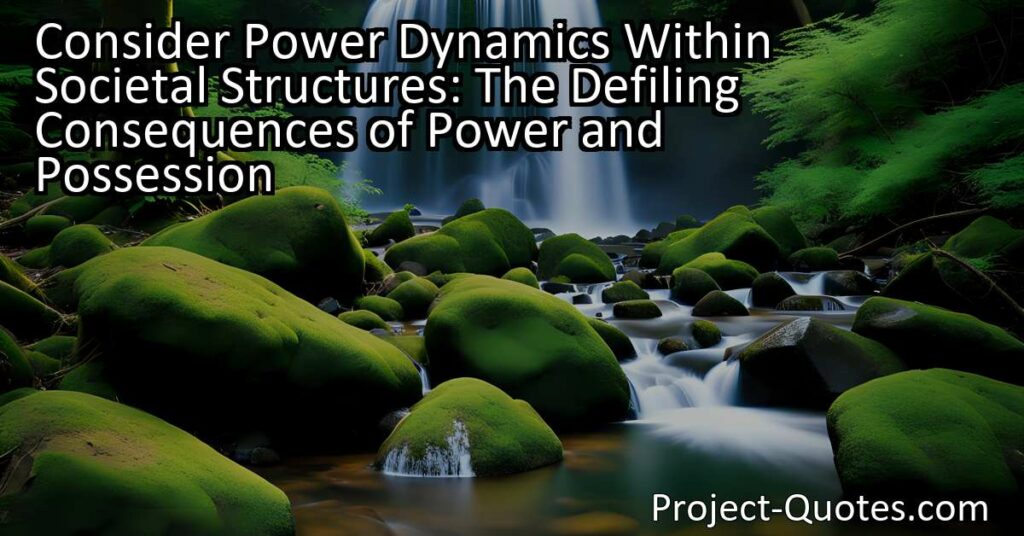To get power over is to defile. To possess is to defile.
Simone Weil
Simone Weil’s thought-provoking words invite us to consider power dynamics within societal structures. By exploring the defiling consequences of power and possession, we can gain a profound understanding of the potential harm caused by the misuse and abuse of power. This understanding prompts us to work towards dismantling unjust hierarchies and fostering a more compassionate and egalitarian society.
Table of Contents
Meaning of Quote – To get power over is to defile. To possess is to defile.
In her thought-provoking words, Simone Weil invites us to ponder the concept of power and possession, shedding light on their darker consequences. Through her poignant quote, she reminds us that the quest for control over others ultimately taints both the oppressor and the oppressed. By exploring the depth of these ideas, we can gain a profound understanding of the potential harm caused by the misuse and abuse of power.
When considering the notion of power, we often associate it with authority and dominance, exerting control over others. It is easy to understand why individuals might seek power, as it provides a sense of security, influence, and the ability to shape the world according to their own desires. However, Weil’s assertion goes beyond this superficial understanding, forcing us to confront the fundamental truth that power can be corrupting.
To defile implies the act of polluting or contaminating something pure, pristine, or sacred. Weil suggests that gaining power over someone or something is equivalent to sullying its inherent value. This raises an important question: How can possessing power be seen as defiling? To grasp the meaning behind these words, it is crucial to delve into the impact power dynamics have on relationships, communities, and individuals.
Throughout history, we have witnessed countless instances of abuse and corruption stemming from individuals seeking to exert their power. One need only glance at the annals of despotic rulers, oppressive regimes, and tyrannical dictators to understand the devastating consequences of unchecked power. As people amass control, their motivations often shift, leading to disregard for the well-being and freedom of those under their authority. This tendency to defile arises from a loss of empathy, an overinflated sense of entitlement, and a diminishing regard for the sanctity of others’ lives and dignity.
Moreover, to possess is just as defiling as gaining power over someone or something. The act of possession implies ownership and control, which can distort the nature of relationships and diminish the value of the object or person being possessed. When we claim possession, we establish a power dynamic that allows for exploitation, objectification, and dehumanization.
Consider the possessions we covet: material objects, wealth, and even intellectual property. Acquiring these things often becomes an all-consuming pursuit, leading individuals to prioritize their possessions over human connection and compassion. This obsession with ownership can blind us to the value of intangible qualities such as love, kindness, and empathy.
Furthermore, the concept of possession extends beyond material goods. It encompasses relationships, where individuals sometimes regard their partners, friends, or family members as possessions to control or dominate. This mentality disregards the rights, autonomy, and individuality of those we claim to love. It diverges from the understanding that healthy relationships are founded on mutual respect, trust, and a recognition of each person’s inherent worth.
To fully appreciate Weil’s quote, it is essential to consider power dynamics within societal structures. In many instances, oppressive systems perpetuate and reinforce inequalities, leading to the abuse of power. This may manifest through racism, sexism, classism, or any other form of discrimination. Such systems provide a framework that upholds and perpetuates the notion that some groups possess power over others, leading to defilement and marginalization of the oppressed.
By acknowledging the potential harm of power, we can work towards dismantling unjust hierarchies and fostering a more egalitarian society. Recognizing the defiling nature of power prompts us to adopt an inclusive perspective, where the well-being and dignity of all individuals are valued. In doing so, we cultivate a society that prioritizes justice, compassion, and the empowerment of the marginalized.
In conclusion, Simone Weil’s words offer us profound insight into the nature of power and possession. By illuminating the defiling consequences of gaining power over others and the act of possessing, she compels us to question our own desires for control. We must recognize that unchecked power and possessiveness can lead to the erosion of empathy, the proliferation of injustices, and the marginalization of others. By exploring the depth of Weil’s quote, we can embrace a more compassionate and egalitarian approach towards power dynamics, seeking a world that fosters respect, empathy, and dignity for all.
I hope this quote inspired image brings you hope and peace. Share it with someone who needs it today!


